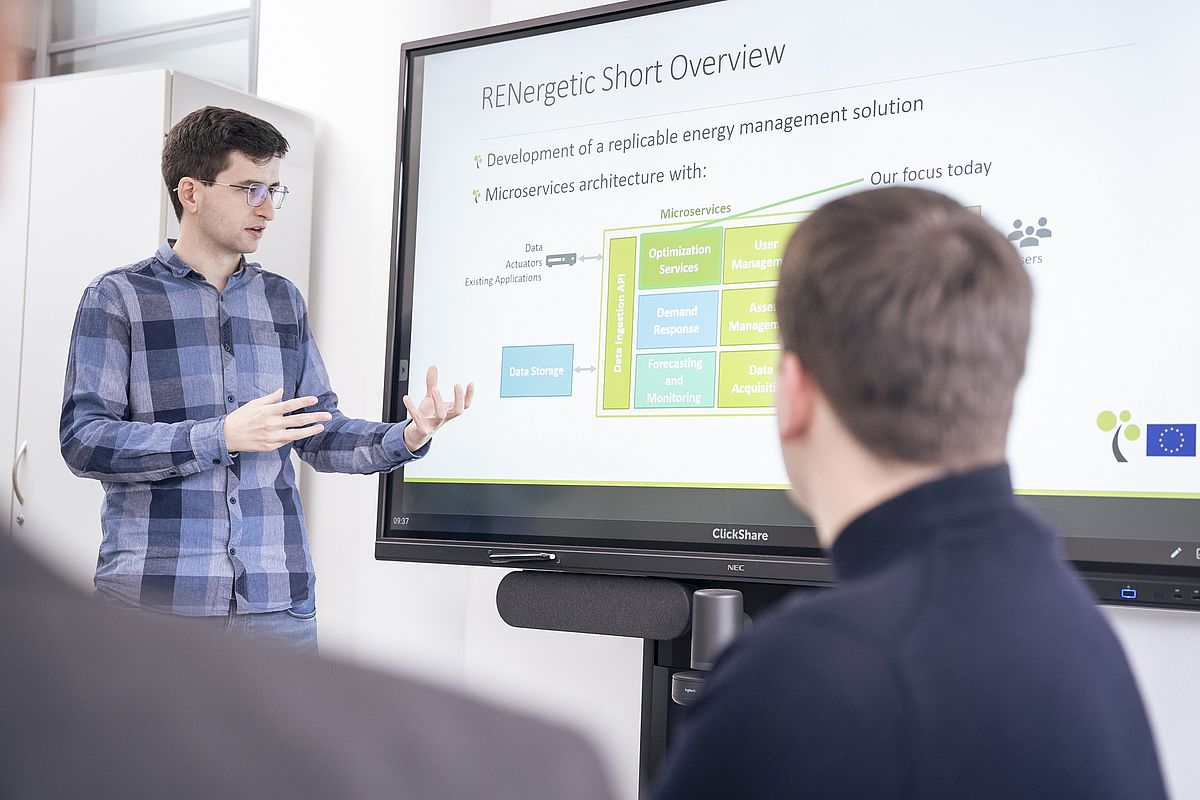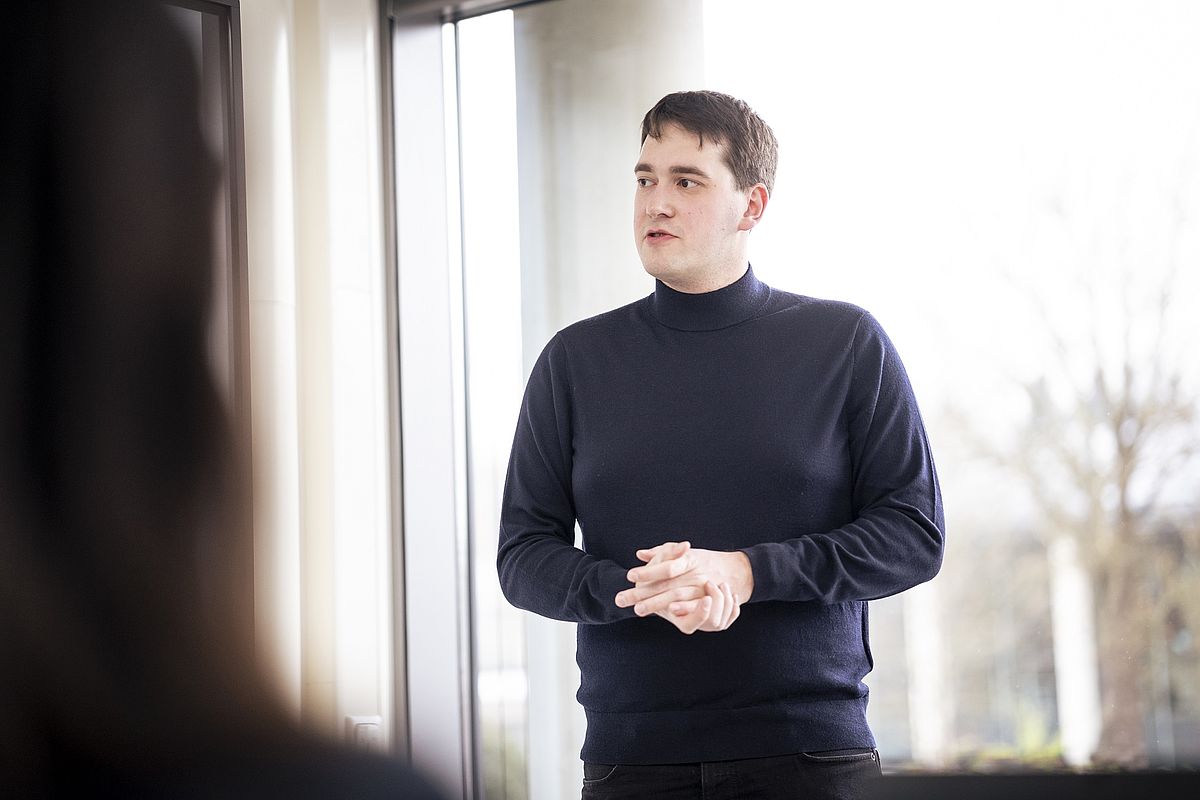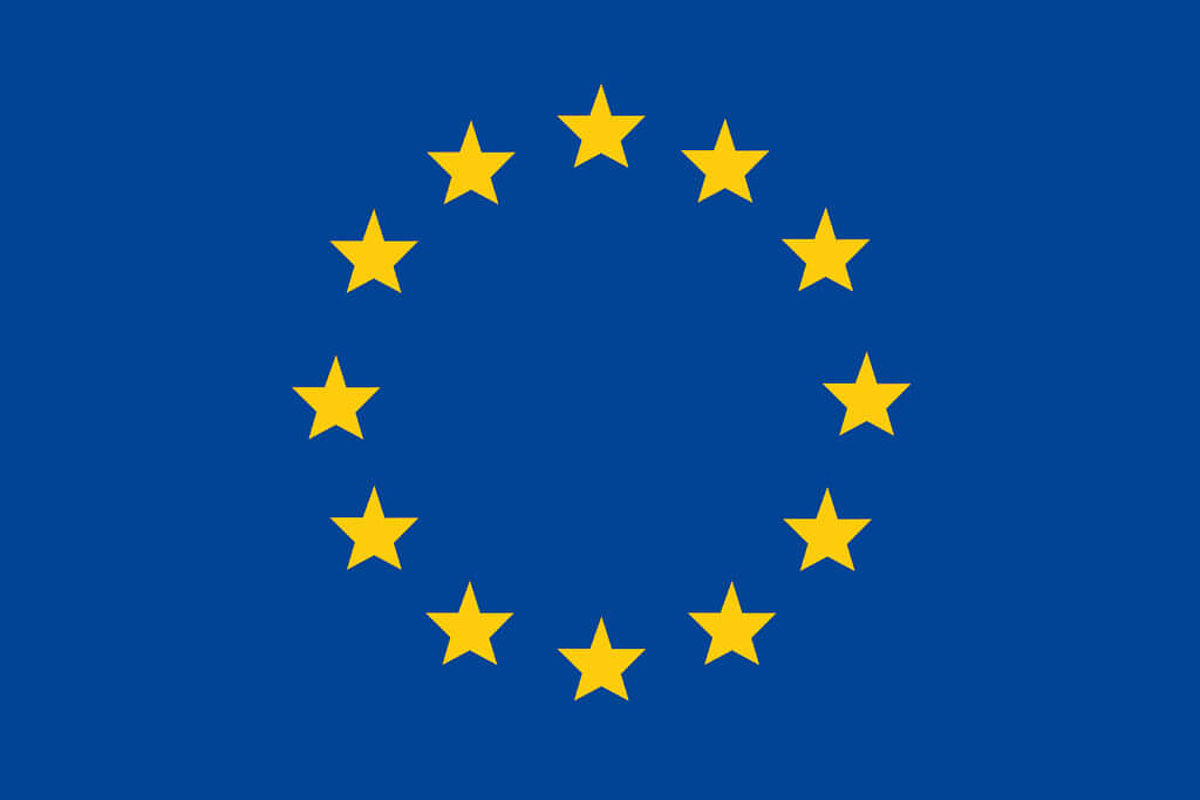Professor Hermann de Meer in conversation with the Renergetic team from his department. Pictured left: project coordinator Stepan Gagin; photos: University of Passau
A few years ago, the harbour in Ghent, Belgium, was virtually a no-man’s land. Now, it’s a place of the future, with a new district composed of 400 apartments being built, which the European Union is using as a kind of test laboratory for how a sustainable and high-quality neighbourhood can be created in an urban environment.
The New Docks are one of three energy islands in the EU's RENergetic project to which a team of researchers from the University of Passau are contributing their expertise. Led by Professor Hermann de Meer, a computer scientist, the researchers are testing whether the district can function as its own energy island—that is, independently of external energy sources. To this end, they have used intelligent algorithms to develop an energy management system that incorporates and optimises consumption and generation across multiple sectors, including electricity, heat, and mobility.
The IT solution for the New Docks is being partly developed in Passau. The heart of the Passau solution is a server located in a small room in the ITZ building of the University of Passau. Stepan Gagin, a doctoral candidate at the University of Passau, is coordinating Passau’s part of the project and, together with his colleague Armin Stocker, also a a doctoral candidate, is in charge of overseeing that everything is running according to plan.
Hardware-in-the-Loop simulation in the Energylab
The server is the project's “Energylab.” It is used to test algorithms and control strategies related to the behaviour of power electronics using a hardware-in-the-loop (HIL) simulation, which doesn’t interfere with operations at the pilot sites. This enables the researchers to carry out what-if research on different scenarios before the experiments are used in the real-life pilots.
Playing the video will send your IP address to an external server.
The simulation in the “Energylab” was developed by Stocker. He is a true native of the University of Passau: having grown up in Lower Bavaria, he decided to study computer science at Passau for his bachelor’s and master’s degrees. During his bachelor's degree, he worked as a student assistant at the Chair of Computer Networks and Computer Communications at the University of Passau. “I loved playing computer games as a child and wanted to programme them myself,” he says, explaining his motivation to focus on computer science.
During his studies, he was fascinated by computer science’s many areas of application as, for example, in the control of power grids, which is a topic that de Meer has specialised in for years and which has occupied a niche that is becoming increasingly important for the energy transition. This is because electricity generated from distributed renewable energy sources is key to the energy transition.
However, wind and solar generated electricity share a significant problem: they are subject to massive fluctuations which pose major challenges for the grid. The Passau computer science team developed an IT solution for managing this in a previous EU project. Stocker was involved as a student assistant, which makes the EU RENergetic project a natural continuation of his studies.
EU project RENergetic: IT solution from Passau for the energy revolution from the bottom up
A residential area in the Belgian city of Ghent, a university campus in Poznan, Poland, a hospital in Milan: at these three locations, the EU project RENergetic is investigating how citizen energy can be successful.
English-Language Master’s Programme in Computer Science
The Faculty of Computer Science and Mathematics attracted Stepan Gagin, Passau’s project coordinator, to the University of Passau in 2018, where he completed the faculty’s English-language master’s degree in computer science. The master’s program provided a pathway to a doctorate. Originally from the Russian city of Yekaterinburg, Gagin had been researching interesting international master's programmes in English on the internet when he came across the small town of Passau, which he had never heard of before. The university's English-language master's degree in Computer Science programme convinced him to come to Passau: “The list of English courses that you could take as part of the master's sounded very interesting. So, I started looking for pictures of Passau on the internet and when I saw the pictures of the old town, I was stunned,” he says.
View from the castle "Veste Oberhaus" to the snowcovered old town of Passau.
Gagin took the plunge and moved to Passau and hasn’t looked back. “Passau is a small town, but very student oriented. It's easy to strike up conversations with students and colleagues,” he says. “You don't just meet up on campus but also in the town itself. The university organises many events for international students and researchers, both academic and cultural, so there are plenty of opportunities to get to know each other and establish a network of academic contacts.” Gagin now understands German, but occasionally has some difficulties with the local Bavarian dialect, he says with a laugh.
At de Meer's chair, this is not a problem as the chair’s working language is English. Gagin’s international experience is also an advantage when it comes to coordinating the RENergetic project. It is important to take into account the diverse cultural settings of the partners, who are based in six different European countries, says Gagin. A project meeting is held once every three to four months at one of the local partners. Gagin has visited all participating countries at least once. He sees travelling and exchanging ideas with colleagues from other specialist areas and cultures as a privilege of his job.
Balancing energy sources within the Energy Island
Added to this is the communication Gagin has with local citizens as part of the RENergetic project. Involving locals in the project right from the start is part of RENergetic's concept. The fact that Gagin is not only confronted with IT problems in his work but can also carry out reality checks on site was particularly appealing to him.
In his work, he concentrates on optimisation processes. “At the beginning of the project, we discussed the greatest needs with the citizens regarding energy,” he explains. “Almost everyone mentioned solutions for energy management; for example, how we could optimise energy flows between various consumers and producers. An energy island has multiple energy generators, such as heat pumps or boilers and electricity generators. Some of them are flexible. So, as researchers we have to find a balance between their energy generation and consumption by optimising the times when electric vehicles and storage systems should be charged.”
Gagin develops solutions for this, which are then discussed with local residents and energy managers. This is how he discovers incomplete assumptions. For example, he had expected that heat pumps would always be available for activation. However, when talking to the people in Ghent, it turned out that this was not the case. “There were many restrictions, such as the outside temperature and the availability of internal heat sources, that I didn't have on my screen,” he says.
Teambesprechung an der Universität Passau
Smart solutions from a regulatory perspective
The RENergetic project not only involves computer scientists but also researchers from the social sciences such as sociology and psychology as well as law. In the Passau team, Gagin works closely with Alina Anapyanova, who is researching legal aspects associated with the project.

Alina Anapyanova moved to Passau to take up an interdisciplinary doctoral position in the RENergetic project.
Anapyanova also has an international background having initially completed a bachelor's degree in European law at the University of Maastricht in the Netherlands. She then went on to complete a master's degree in international public management at Science Po in Paris. Afterwards, she continued her academic career at Darmstadt University of Applied Sciences.
She moved to Passau to take up an interdisciplinary doctoral position in the RENergetic project. Anapyanova’s work is based at the Faculty of Law with Professor Urs Kramer and de Meer as co-supervisors: “I'm concentrating on the German energy market and looking at how partially self-sufficient energy communities can be implemented here and act in a grid-friendly manner.” She draws inspiration from the Faculty of Mathematics and Computer Science, especially from her project work as part of RENergetic.
Passau was also new to Anapyanova, but the charm of the small town and the working environment captivated her: "I enjoy the close dialogue with colleagues from other disciplines." She also specialises in smart solutions, albeit in the regulatory field. After all, the energy transition requires more than just technology; it also depends on the involvement of citizens and business stakeholders. This is where Anapyanova's work comes in. She works with people to develop smart solutions for a regulatory framework that sets the right incentives without being too complex.
The researchers in the EU Horizon project RENergetic may come from different disciplines. But they are all united by a common goal: to develop and test out new solutions in collaboration with local citizens in order to make the energy transition a reality.
Mehr Informationen und Förderhinweis
"Funded by the European Union. Views and opinions expressed are however those of the author(s) only and do not necessarily reflect those of the European Union or Horizon Europe. Neither the European Union nor the granting authority can be held responsible for them."
This article was first published on the Research in Bavaria portal of the Bavarian State Ministry of Science and the Arts. To the original article

















